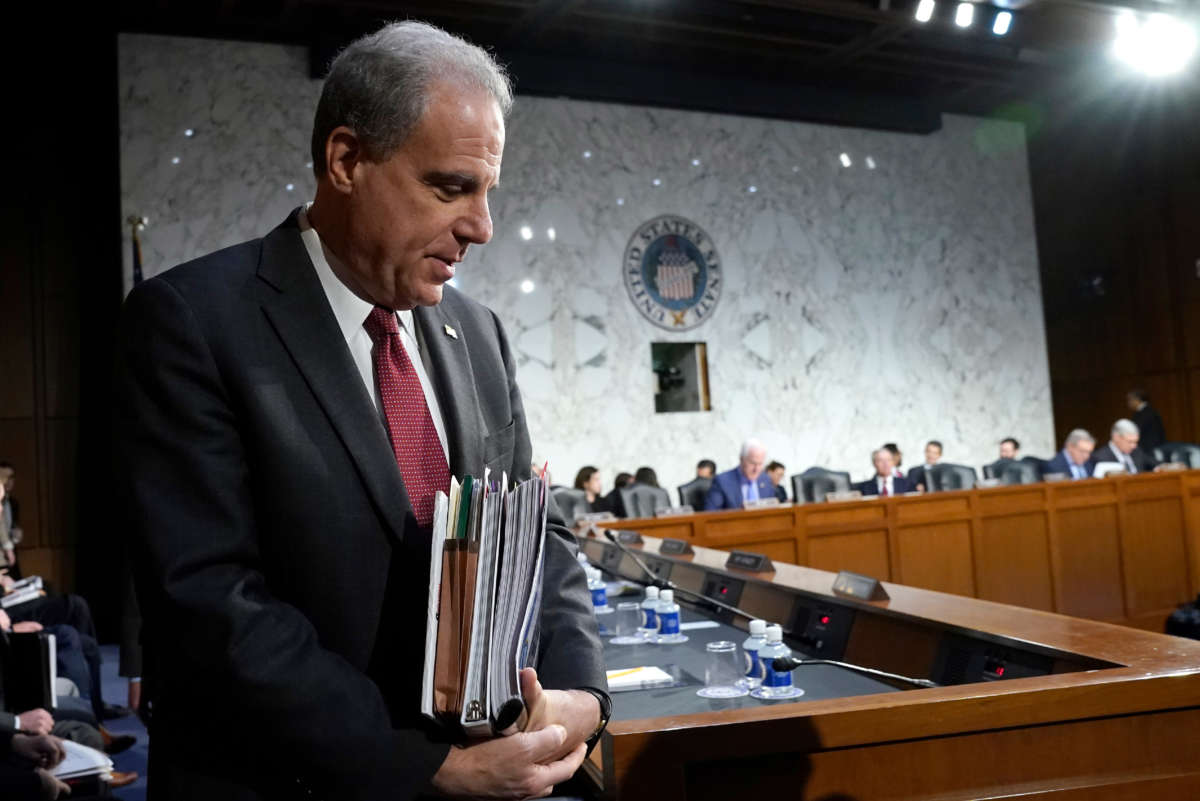The inspector general’s office within the Department of Justice (DOJ) is opening an investigation into whether officials in that department tried to use the powers delegated to them through their employment to attempt to help former President Donald Trump overturn the results of the 2020 presidential race.
DOJ Inspector General Michael Horowitz announced the launch of the inquiry, which would be limited solely to investigating officials in that department, on Monday. Horowitz stated that the inquiry was being opened in order to reassure the public that recent events, related to reports of a scheme by a former DOJ official to overturn election results in Georgia, are being looked into.
“The inspector general is initiating an investigation into whether any former or current DOJ official engaged in an improper attempt to have DOJ seek to alter the outcome of the 2020 presidential election,” a statement from Horowitz said.
The announcement from Horowitz comes days after reporting from The New York Times indicated that a DOJ lawyer and Trump loyalist named Jeffrey Clark had approached the former president with a plan that would allow them to overturn Georgia’s presidential results in Trump’s favor. President Joe Biden defeated Trump in Georgia, becoming the first Democratic presidential candidate since 1992 to win that state.
Clark, who was sympathetic to the former president’s false claims of election fraud, suggested to Trump that he should fire then-acting Attorney General Jeffrey Rosen, replacing him with Clark instead who would then take the necessary steps toward responding to Trump’s claims that Georgia’s presidential election outcome was stolen from him.
Clark had met with Trump earlier this month to discuss his plan for overturning the election and had told Rosen about it shortly after that meeting, prompting Rosen to then demand a meeting with Trump to find out how serious the former president was about the plan. In addition to Trump, that meeting was attended by Clark, Rosen, White House counsel Pat Cipollone, and another unnamed senior Justice Department official, sources speaking to The Times said.
At the meeting, both Clark and Rosen reportedly tried to convince Trump to adopt their views on what course of action should be taken. But before Trump could make a decision, word got around that several officials at the DOJ had said that they would resign in protest if the former president sought to carry out Clark’s plan.
Upon weighing the public relations impact of mass protest resignations at the DOJ, Trump is reported to have backed off from consideration of Clark’s vision, conceding that it probably would not work in his favor.
Following publication of The Times’s report, Senate Majority Leader Chuck Schumer (D-New York) blasted Clark’s alleged scheme, and called for an inquiry into the matter.
“Unconscionable [that] a Trump Justice Department leader would conspire to subvert the people’s will,” Schumer wrote in a tweet on Saturday. “The Justice Dept Inspector General must launch an investigation into this attempted sedition now.”
Trump has pushed a number of baseless and unfounded claims of election fraud, in Georgia and elsewhere, since he lost the presidential election to Biden in November. Yet, in spite of having an attorney general who was loyal to him, the DOJ would not open an inquiry into his assertions of fraud.
In mid-December, then-Attorney General William Barr, who was days away from resigning his post, said he saw no basis to seize voting machines or otherwise issue orders to investigate claims of fraud in Georgia.
“If I thought a special counsel at this stage was the right tool and was appropriate, I would name one, but I haven’t, and I’m not going to,” Barr, who was one of Trump’s most ardent loyalists in the executive branch, said at the time.
In addition to an inquiry into current and former DOJ officials and their possible attempts to overturn the election on his behalf, Trump himself is facing an impeachment trial in the Senate, set to commence next month. Although he cannot be removed from the presidency, as he is already out of office, the trial could result in his being barred from being able to hold federal office ever again.
Trump’s impeachment in the House of Representatives this month came about after a majority vote in that legislative body determined he had incited a mob of his loyalists to attack the Capitol building on January 6 during a rally outside the White House earlier in the day. Five individuals died as a result of the breach of the Capitol that day.
Join us in defending the truth before it’s too late
The future of independent journalism is uncertain, and the consequences of losing it are too grave to ignore. To ensure Truthout remains safe, strong, and free, we need to raise $43,000 in the next 6 days. Every dollar raised goes directly toward the costs of producing news you can trust.
Please give what you can — because by supporting us with a tax-deductible donation, you’re not just preserving a source of news, you’re helping to safeguard what’s left of our democracy.
